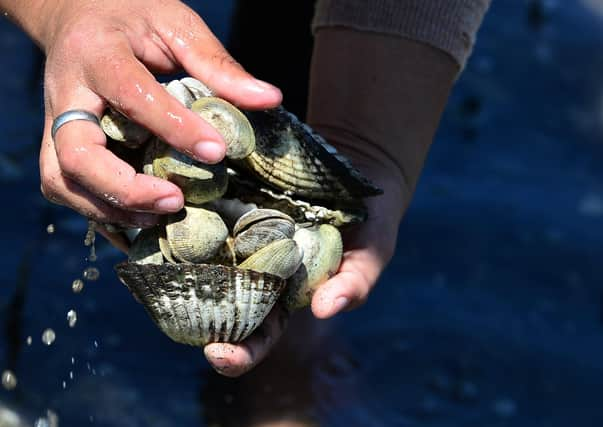Beach shellfish pickers are given advice on ‘slavery’


More than 50 Chinese workers were spoken to as part of a three-day awareness and engagement operation involving the Gangmasters and Labour Abuse Authority (GLAA) and partners in Scotland.
High visibility patrols by GLAA officers, Police Scotland, East Lothian Council and Fife Council were carried out from Friday, September 18 to Sunday, September 20.
Advertisement
Hide AdAdvertisement
Hide AdResources across the three days were focused on beaches at Musselburgh and Pettycur, with other patrols at Port Seton, Dunbar, Whitesands Beach and Shell Bay.
Thirty Chinese pickers were observed hand-gathering shellfish across East Lothian and Fife on the first day. They had buckets or large bags containing razor clams, king clams and cockles.
All were handed leaflets outlining their employment rights and how to spot the signs of modern slavery and human trafficking. They were also given guidance on the amount of shellfish they could collect from the sands for their own personal use.
Seven gatherers were spoken to at Shell Bay on Saturday and a further 15 were handed awareness-raising material at Musselburgh, Port Seton and Whitesands on Sunday.
Advertisement
Hide AdAdvertisement
Hide AdGangmasters target vulnerable people who are forced to work – many to pay off the costs of travelling to the UK – and pay them a pittance. Some organised crime gangs specialise in exploiting people from China, effectively enslaving them.
In February 2004, at least 21 Chinese undocumented immigrant labourers were drowned by an incoming tide after picking cockles off the Lancashire coast while being paid just £5 a basket. The gangmaster behind the tragedy was later jailed for 12 years.
GLAA Senior Investigating Officer Martin Plimmer said: “This operation was organised in response to a notable increase in intelligence relating to unsafe working practices and potential exploitation in the shellfish gathering sector over recent months.
“This has been an issue which began around the time of lockdown and has continued since then. We are committed to working with partners to drive labour abuse out of our communities and protect vulnerable workers from exploitation by educating them about their rights and responsibilities in gathering shellfish safely.
Advertisement
Hide AdAdvertisement
Hide Ad“There was really positive engagement with local residents who are keen to help ensure that their neighbourhoods remain free from exploitation and dangerous working practices.”
Comment Guidelines
National World encourages reader discussion on our stories. User feedback, insights and back-and-forth exchanges add a rich layer of context to reporting. Please review our Community Guidelines before commenting.